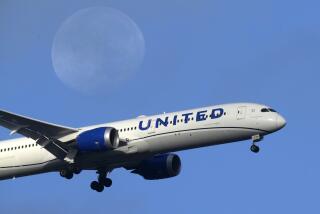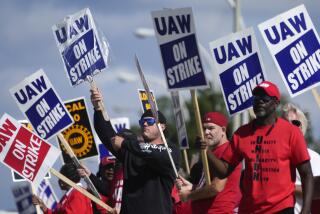A Brave New World in Bid by UAL Pilots
- Share via
The pilots and other employees of United Airlines seem about to win the bidding contest for UAL Inc. in a buyout worth at least $6.5 billion, and make it the largest employee-owned company in the United States.
Wow, you say, are the employees getting a good deal? Have working people discovered a get-rich-quick scheme of their own?
The answer is yes, it’s probably a good deal, but get rich quick it isn’t. If the employees get rich at all it will be slowly--a payoff is at least several years away--and meanwhile there is risk, and cuts in pay and changes in the way they work.
And that’s not all. Ownership will change profoundly the employees’ understanding of job security, union membership and collective bargaining. Who represents the workers, after all, when the workers are the bosses?
Davis Could Bid Higher
Before United’s people enter that brave new world, of course, they first must lock up the deal. But there’s not much uncertainty. Investor Marvin Davis still could bid higher than the $300 a share that the Airline Pilots Assn.’s group offered last week. But even if Davis offers more, says analyst Daniel Hersh of Bateman Eichler, Hill Richards, it’s unlikely he can buy the airline without the promise of wage and work-rule concessions from United’s employees and the tax advantages of their proposed employee stock ownership plan.
So in the near future, presuming that other details are worked out, the airline is likely to be 75% owned by its pilots, machinists and flight attendants, with British Airways owning 15% and UAL’s current management owning 10%. The managers will continue to manage, but under the supervision of an employee-controlled board.
But then will come years of pay-back and change. To pay their share of the buyout, the pilots are going to put up some of their pension money and give wage and work rule concessions worth $250 million a year for an undisclosed number of years. That means they will fly more hours per month at the same or lower pay and accept labor-saving advances such as new planes that fly with two men in the cockpit instead of three. United’s other unions will give $120 million a year in concessions producing a total of $370 million a year in cost reductions to help United repay the borrowings that finance the buyout.
The really subtle changes, however, will come when air travel hits one of its periodic downturns. Normal practice in the industry is to furlough employees--airline jargon for lay off. But in the new United how will furloughs be decided? Can union seniority rules--layoffs for younger pilots, flight time for older ones--apply when all are owners? Or will the solution be shared misery: Short weeks to stretch the work, collective wage cuts to meet the payroll. It’s all part of owning a business, after all.
Security an Issue
Small wonder that labor expert Brian Freeman, an investment banker who is currently representing United’s machinists, says traditional collective bargaining agreements that protected workers and left the headaches to management are preferable to employee ownership plans. “Unions should be concerned with long-term job stability, not ownership.”
Freeman may be right, but so what? In today’s world of rapid economic change, takeovers and mass layoffs, the security of traditional labor-management contracts has been taking a beating--especially in the deregulated airline industry.
In fact, the most secure employment in the industry has been offered by mostly non-union Delta Airlines, which has not laid off an employee since the late 1950s and could serve as a lesson plan for United Airlines employee owners-to-be.
How does Delta do it? Often with common sense. In the 1970s, when air travel fell due to the energy crisis, now-retired Chairman David C. Garrett asked shareholders to take a lower dividend so loyal employees could keep their jobs.
Then in the recession of the early 1980s, Delta employees worked at whatever was available rather than be laid off. Unionized pilots loaded baggage, others did extra duty in the marketing department.
The result is that Delta has more than its share of long-term employees, and that means higher labor costs. But it also has a high reputation for service--and that is paying off in all its markets today.
Of course, Delta’s a throwback, an example of paternalistic, if intelligent, management, and different from an employee-owned or even a heavily unionized company. But if United’s new owners can borrow some of that intelligence--as well as the flexibility and quality of service--they can do even better than Delta’s people. Because their success can produce a real pot of gold.
When the UAL buyout debt has been paid down--perhaps five or six years from now--United Airlines will sell stock to the public again. And then the employees who today are pledging their pension and wages and work rules will be able to reap the rewards of ownership. And they’ll have earned them.
More to Read
Inside the business of entertainment
The Wide Shot brings you news, analysis and insights on everything from streaming wars to production — and what it all means for the future.
You may occasionally receive promotional content from the Los Angeles Times.










